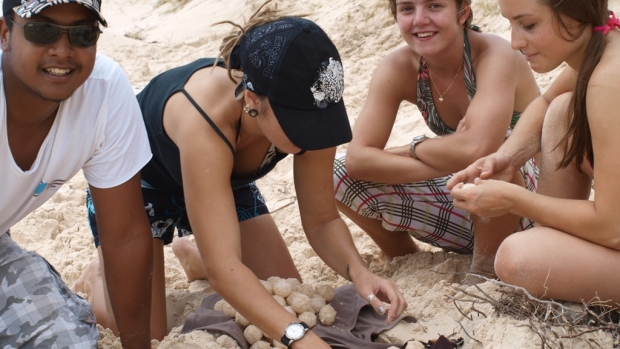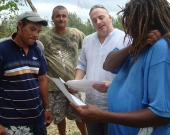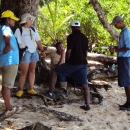Grants :: Small Grant Facilities :: Conserving turtle rookeries on Mahé through improved public awareness and community involvement
Conserving turtle rookeries on Mahé through improved public awareness and community involvement

Turtle nest translocation, Mahé, Seychelles © MCSSS , 2010
Objectives
The goal of this Marine Conservation Society Seychelles (MCSS) and MFF project was to identify, monitor and rehabilitate priority sea turtle nesting beaches on Mahé in collaboration with local communities, businesses and government. The project also aimed to raise the awareness of local people and foreign visitors about turtles and turtle conservation in the Seychelles.
Background
Mahé is the administrative hub of the Seychelles and the most developed island in the archipelago. It is also a favoured nesting area for globally important numbers of endangered hawksbill and green turtles. Once numerous, these turtles are now much reduced and, despite the protection offered to adult turtles, their rookeries are threatened by human disturbance. The Ministry of Environment is mandated to protect sea turtles but has only a limited operational budget, preventing it from devoting sufficient attention to key nesting beaches. This project aimed to support government policy and enlist the help of the local community in protecting nests from deliberate or accidental interference. Contributions from the private sector (particularly tourism businesses) in the form of sharing benefits with the community will help to ensure project sustainability.
Target beneficiaries
Members of turtle monitoring groups (at the end of the project these numbered six men and seven women), hotels on nesting beaches, and interested community members.
Outputs
- Increased rates of nesting success at the selected priority turtle rookeries.
- Local monitoring and management projects established on key nesting beaches.
- New partners and funding sources identified to support management of turtle rookeries.
- Enhanced public awareness of “turtle-friendly” and “turtle-unfriendly” practices.
- Establishment of management and monitoring mechanisms in cooperation with appropriate authorities and landowners.
- Launching of a nationwide awareness campaign.
Accomplishments and challenges
The project successfully encouraged local communities, individuals and businesses to take responsibility for their beaches. Project interventions included training people in monitoring techniques and developing a protocol for reporting any unusual activity, for example poaching, or emergencies, such as injured turtles or females laying eggs in areas where they would be at risk.
Six new cooperative monitoring projects were established. Of these, three proved sustainable and have continued beyond the end of the project, each project group caring for one beach. In four cases, nests were moved away from high-risk areas, allowing the emergence of more than 300 healthy hatchlings that would otherwise have perished.
Challenges
The project suffered some delays, most notably in the nationwide awareness campaign which had to be suspended until the pre-campaign turtle survey was completed (this delay was due to limited local capacity). The campaign was eventually (and successfully) launched in February 2011.
Contributions to cross-cutting themes
Communications
The project received good media coverage, with six newspaper articles published covering turtle issues. The project produced turtle awareness leaflets, an eight-page colour booklet with advice on turtle conservation for beachfront property owners, a brochure giving the public advice on how they can help protect turtles, and a signboard in four languages. The project also organised a poster competition at four coastal schools on the theme of how to save sea turtles and whale sharks. The winning designs were printed on T-shirts and distributed to the schoolchildren.
Gender equality
Participation in the project suited people who were not at work all day or who could contribute a few hours of their spare time. Both men and women took part in the project; its staff members also included men and women.
Climate change
Variations in temperature affect different stages of the sea turtle’s life cycle – from the nest temperature which determines sex in the turtle embryo, to changes in sea temperature which influence and dictate foraging areas, to climatic changes which determine the availability of nest sites. The project took measures to ensure suitable temperatures for egg development, for example by rehabilitating beaches to provide the levels of shade needed to yield a favourable ratio of male and female embryos. Eggs laid in dangerously eroded areas were also relocated. Lastly the monitoring data produced by the project were fed to national initiatives monitoring climate change.
Lessons Learned
The project has shown that the best way to achieve success is to involve local stakeholders and listen to their comments. Future interventions of this type must provide regular feedback and reinforcement for project outputs to ensure stakeholders stay active and committed.
Project communication needs to be comprehensive and regular – leaving participants “in limbo”, even when assuming they know what is happening, is a mistake and leads to disaffection and ineffectiveness.
Related News
MFF projects encourage public participation in coastal management
Bangkok, Thailand 25 Jul 2012
Country: Asia Region
Topic: Capacity development, Civil Society Engagement, Capacity Building ...
MFF aims to achieve long term solutions that contribute to regional and national efforts that ensure environment issues are mainstreamed in development planning and activities. Hence, bringing together governments, non-government entities and the pr...
Project Facts
Country
Location
Ten beaches in southern Mahé, Seychelles
Topic
- Knowledge for Management
- Strategies for Management
- Civil Society Engagement
- Climate change
- Gender equality
- Knowledge management and communications
Duration
1st Jul 2009 to 31st May 2011
MFF Grant Amount
US$24,950
Co-financing Partner
In-kind support and facilitation were provided by the Seychelles government (Department of Environment, Department of Education, Hotels Association and Seychelles Tourism Board), private sector (Banyan Tree Resort, Chalets Anse Forbans and Four Seasons Resort) and civil society (Wildlife Clubs of Seychelles).
Implementing Partner
Dr David Rowat
Marine Conservation Society,
Seychelles (MCSS)
PO Box 384, Victoria,
Mahé, Seychelles
Tel: +248 345445
“The project sensitized the general public to the issues facing the remaining turtles and educated them on how they can help to protect and enjoy these incredible creatures.”
— GEORGIA FRENCH
MCSS PROJECT COORDINATOR



